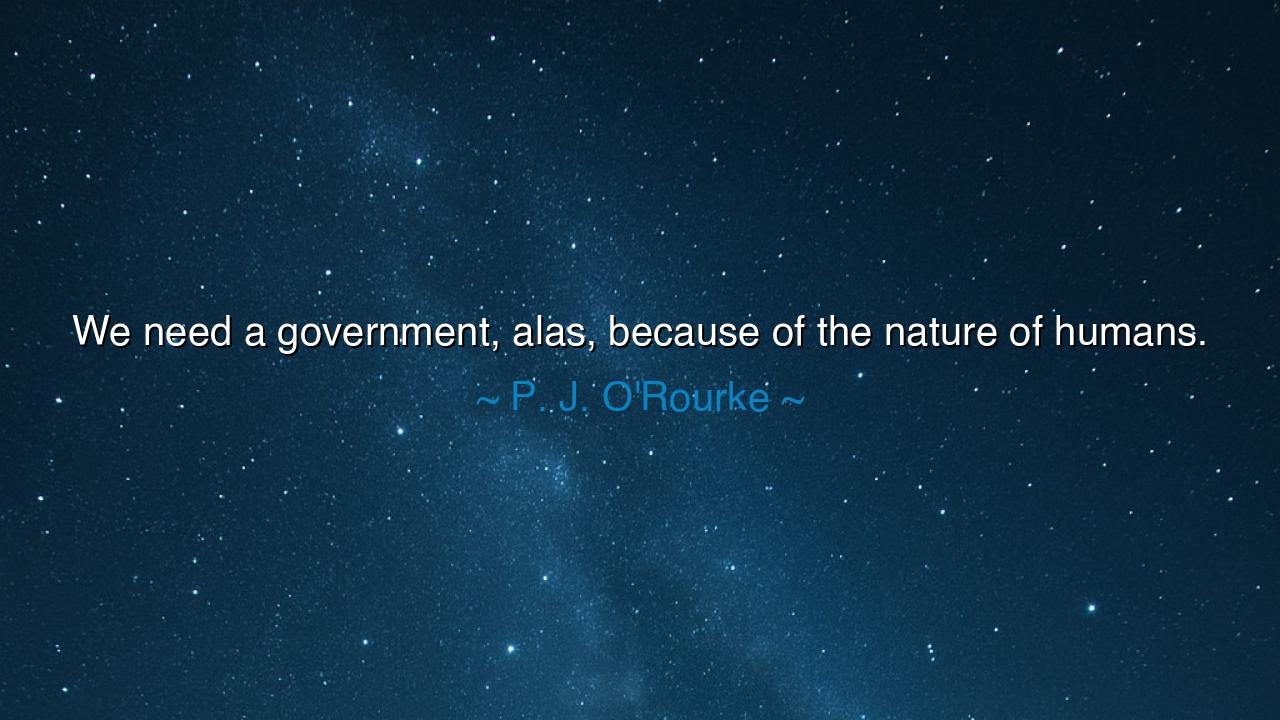
We need a government, alas, because of the nature of humans.






"We need a government, alas, because of the nature of humans." — P. J. O’Rourke
In this brief but piercing line, P. J. O’Rourke lays bare one of the oldest truths of civilization: that government, with all its flaws and weight, is not born of ambition alone, but of necessity. He sighs, “alas,” for he knows that the need for governance springs not from our virtues, but from our imperfections. Were mankind made wholly of light, of reason and benevolence, there would be no need for law or authority; yet men are a mixture of heaven and clay. Within each heart dwells both the angel and the beast, and thus, to live together in peace, we must chain the beast without destroying the man.
When O’Rourke speaks of the nature of humans, he echoes the ancient wisdom of philosophers from Plato to Hobbes, who saw that liberty without order becomes chaos. Plato warned that unchecked freedom can turn the soul wild, while Hobbes described the state of nature as a world where life is “nasty, brutish, and short.” Even the wisest among us falter when temptation whispers or pride burns. So humanity, seeing its own weakness reflected in countless generations, forged the tool of government—not as a weapon of domination, but as a mirror of restraint, a reminder that power must serve justice, and freedom must walk hand in hand with duty.
Let us remember the story of the fall of Rome. In the days of the early Republic, discipline, honor, and civic virtue bound men together; the Senate ruled not merely by law but by shared belief in duty. Yet as wealth grew and self-interest festered, that virtue eroded. Senators served not Rome, but themselves; citizens demanded bread and spectacle instead of responsibility. In this decay of human nature, the republic crumbled into empire, and liberty bowed before the sword. The lesson is as bitter as it is timeless: when humans forget their flaws and abandon self-restraint, government grows stronger, for it must rise to bind what conscience once restrained.
There is a certain sadness in O’Rourke’s “alas.” It is the sigh of one who wishes that humanity could govern itself by inner light alone, yet has witnessed too much to believe it. History is heavy with the proof: every utopia, every dream of a world without authority, has ended in disorder. The anarchists of Paris in 1871 cried for absolute freedom, yet soon their freedom devoured itself in chaos and blood. For without structure, even the noblest ideal dissolves. Government, flawed though it may be, becomes the wall that keeps the flood of our passions from washing away all order.
But there is another truth here, subtle and radiant: that while we need government, we must also guard against its excess. For just as men are corruptible, so too are the institutions they build. The hand that restrains must not become the fist that crushes. A good government, therefore, is one that remembers its origin — born not from superiority, but from shared human frailty. Its rulers are not gods, but servants of the same imperfection they are sworn to guide.
Reflect then, traveler of time, on what this means for your own life. You too carry within you the warring impulses of pride and compassion, of greed and grace. The laws of nations are but reflections of the laws that must govern the heart. If you would have a just society, you must first govern yourself. Rule your temper, discipline your desires, and you will become a citizen fit for freedom. For no government can grant liberty to those who cannot rule their own impulses.
So, let O’Rourke’s words ring not as despair, but as a call to wisdom. Yes, we need governments because of what we are — imperfect, passionate, yearning beings. But we also have within us the capacity to rise above that nature, to balance our impulses with reason and our freedom with care. The best government begins where the best citizens stand — in hearts disciplined by conscience and guided by humility.
Lesson: Government exists because we are human — flawed, ambitious, capable of both good and evil. The wiser we become about our own nature, the less tyranny we require from others.
Practical Action: Seek to govern yourself each day. Keep order in your words, fairness in your dealings, and justice in your heart. For when enough men and women learn to rule their own passions, the need for harsh rule fades — and true liberty begins.






AAdministratorAdministrator
Welcome, honored guests. Please leave a comment, we will respond soon